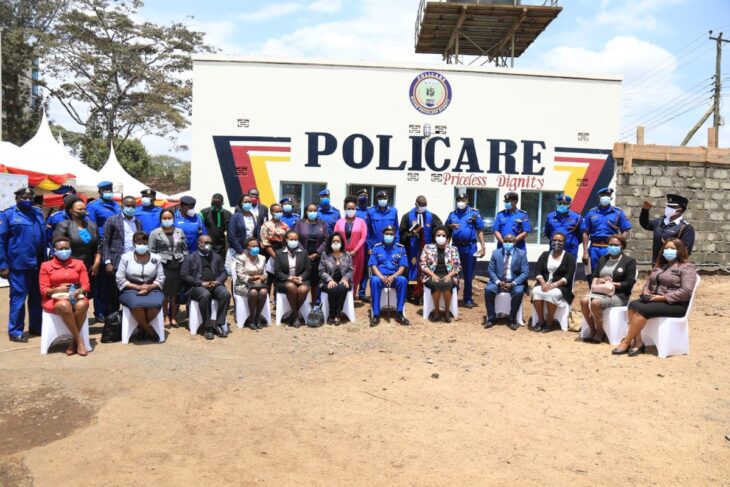NAIROBI, Kenya, Oct 12- Police authorities are Tuesday scheduled to launch an initiative they say will help survivors of Sexual and Gender-Based Violence (SGBV).
The Policare initiative is a new program being tested in the National Police Service with an aim of restoring priceless dignity to such victims.
Inspector General of police Hilary Mutyambai told Shahidi News that the initiative is a one-stop centre offering a holistic and multi-sectoral criminal justice solution to survivors of SGBV.
He added the service is committed to and continues to serve citizens, especially survivors of SGBV in a responsible, responsive, and timely manner.
First Lady Margaret Kenyatta will be the Chief Guest during the launch.
The IG said NPS with partners have joined hands to have a one-stop centre solution where survivors of SGBV are attended to with dignity and confidence from reporting, medical examination and forensic analysis, counseling, and finally criminal justice through court prosecution under one roof.
The centres, dubbed policare have been established in collaboration with the Ministry of Public Service and Gender to ensure SGBV survivors can access counseling, medical and legal services from one place.
The National Police Service with support from UKAID through the Reinvent Programme has since established several one-stop sexual gender-based violence centres in Nairobi and Makueni Counties during the pilot stage.
Most victims and survivors of Sexual and Gender-Based Violence often blame the police for conducting shoddy investigations hampering their quest for justice.
More than often, this has led to the perpetrators walking scot-free or being acquitted in court, for lack of evidence.
The model unit by the National Police Service (NPS) is designed to host all professionals involved in delivering justice to offenders while preserving the dignity of the victims.
Policare centres are set to be staffed 24 hours a day and supported by toll-free service to reach to more survivors.
A policare centre has an interview room for women and children, a crime records room, a triage, forensic evidence storage room, trauma centres, a room for medical examination and P3 issuance and male and female holding cells.
The National Council on Administration of Justice has reported: “a significant spike in sexual offences in many parts of the country.”
This has been so since March 2020, where the first case of COVID-19 disease was reported.
According to the Council, “in some cases, the perpetrators are close relatives, guardians and/or persons living with the victims.” The report pledged that “the courts will consider giving directions on early hearing dates in such cases.”
According to available statistics, violence is a daily reality for women and girls across Kenya.
Data provided by the government indicates that 45 percent of women and girls aged 15 to 49 have experienced physical violence and 14 percent have experienced sexual violence.
Many cases are not reported to authorities and few women get justice or receive medical care, a trend the government through policare is hoping to reverse.
According to the Human Rights Watch, the restrictions imposed in response to the COVID-19 pandemic are likely to make it harder for survivors to report abuse and seek help and for service providers to respond efficiently.
Sexual and other forms of violence against women have devastating consequences including injuries and serious physical, mental, sexual, and reproductive health problems, including sexually transmitted infections, HIV, and unplanned pregnancies.
“The Kenya government should urgently protect women and girls against violence during this crisis. Its public awareness campaigns should highlight this risk and give detailed information on how victims, including those infected with COVID-19, can access services,” the lobby group said in a report in Aprile 2020.
“It should treat services for women who experience violence as essential, ensure these services have the resources they need, and make alternative accommodation available when the current limited shelters are full. Violence against women and girls is a crime, and they have a right to be protected even when the government is preoccupied with a pandemic.”
What is Sexual and Gender-Based Violence?
Sexual and gender-based violence (SGBV) refers to any act that is perpetrated against a person’s will and is based on gender norms and unequal power relationships.
It includes any form of a non-consensual sexual act, attempt to forcefully obtain a sexual act, unwanted sexual comments or advances, or acts to traffic women’s sexuality, using coercion, threats of harm or physical force, by any person regardless of relationship to the survivor, in any setting, including but not limited to home and work.
Six core SGBV types include, rape, sexual assault, physical assault, forced marriage, denial of resources/opportunities or services and psychological and emotional abuse.
Want to send us a story? Contact Shahidi News Tel: +254115512797 (Mobile & WhatsApp)


